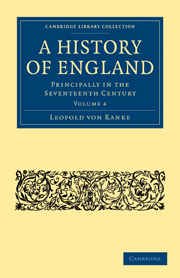Book contents
- Frontmatter
- Contents
- BOOK XVI THE LATER YEARS OF CHARLES II, 1675—1685 WHIGS AND TORIES
- BOOK XVII REIGN OF JAMES II, FEBRUARY 1685 TO SEPTEMBER 1688
- BOOK XVIII THE FALL OF JAMES II IN ITS CONNEXION WITH THE EUROPEAN CONFLICTS WHICH MARKED THE CLOSE OF 1688
- BOOK XIX COMPLETION OF THE REVOLUTION IN THE THREE KINGDOMS, 1688—1691
- INTRODUCTION
- CHAP. I William of Orange in London. Summoning of a Convention
- CHAP. II First sittings of the Convention. Debates on the vacancy of the Throne
- CHAP. III Elevation of the Prince of Orange to the English Throne. Constitutional limitations of the power of the Crown
- CHAP. IV James II in Ireland supported by help from France
- CHAP. V Dundee in the Scottish Highlands
- CHAP. VI Military events in Ireland in the year 1689
- CHAP. VII Dissensions in the Convention Parliament
- CHAP. VIII Dissolution of the Convention Parliament. First sittings of the Parliament of 1690
- CHAP. IX The Court at Dublin. Rivalry of the French and English Navies
CHAP. II - First sittings of the Convention. Debates on the vacancy of the Throne
Published online by Cambridge University Press: 07 September 2011
- Frontmatter
- Contents
- BOOK XVI THE LATER YEARS OF CHARLES II, 1675—1685 WHIGS AND TORIES
- BOOK XVII REIGN OF JAMES II, FEBRUARY 1685 TO SEPTEMBER 1688
- BOOK XVIII THE FALL OF JAMES II IN ITS CONNEXION WITH THE EUROPEAN CONFLICTS WHICH MARKED THE CLOSE OF 1688
- BOOK XIX COMPLETION OF THE REVOLUTION IN THE THREE KINGDOMS, 1688—1691
- INTRODUCTION
- CHAP. I William of Orange in London. Summoning of a Convention
- CHAP. II First sittings of the Convention. Debates on the vacancy of the Throne
- CHAP. III Elevation of the Prince of Orange to the English Throne. Constitutional limitations of the power of the Crown
- CHAP. IV James II in Ireland supported by help from France
- CHAP. V Dundee in the Scottish Highlands
- CHAP. VI Military events in Ireland in the year 1689
- CHAP. VII Dissensions in the Convention Parliament
- CHAP. VIII Dissolution of the Convention Parliament. First sittings of the Parliament of 1690
- CHAP. IX The Court at Dublin. Rivalry of the French and English Navies
Summary
While Prince William was making it his principal endeavour to combine the two elements of the army with each other, and to give them a common organisation, in which task Churchill assisted him on the part of the English, the elections to the Convention were completed. The first had been held in the capital, for this reason if for no other, that the smaller places might be encouraged by its example. Wherever they took place the troops were withdrawn, as has remained the custom subsequently; nor was any other influence exercised. The old forms, which had lately been called in question, were adhered to all the more rigorously on that account. As the majority of the nation had taken part in the resistance to James II, it could not be but that the result of the elections should harmonise with this feeling.
On the morning of the appointed day—the 22nd of January by the Old Style, the 1st of February by the New—the members who had been elected assembled in the House of Commons at Westminster. Henry Powle was now chosen no longer chairman, as in the preliminary assembly, but Speaker.
This Convention was not what has been called in later times a National Assembly. It had itself been elected in accordance with the old exclusive privileges, in the established parliamentary forms; by its side there appeared the lords spiritual and temporal, who also chose their Speaker—Lord Halifax—on the same day, and claimed the exercise of their old customary privileges in full: the assembly formed a Parliament, only without a king; but from this very omission it derived an enormous increase of power.
- Type
- Chapter
- Information
- A History of EnglandPrincipally in the Seventeenth Century, pp. 490 - 501Publisher: Cambridge University PressPrint publication year: 2010First published in: 1875



